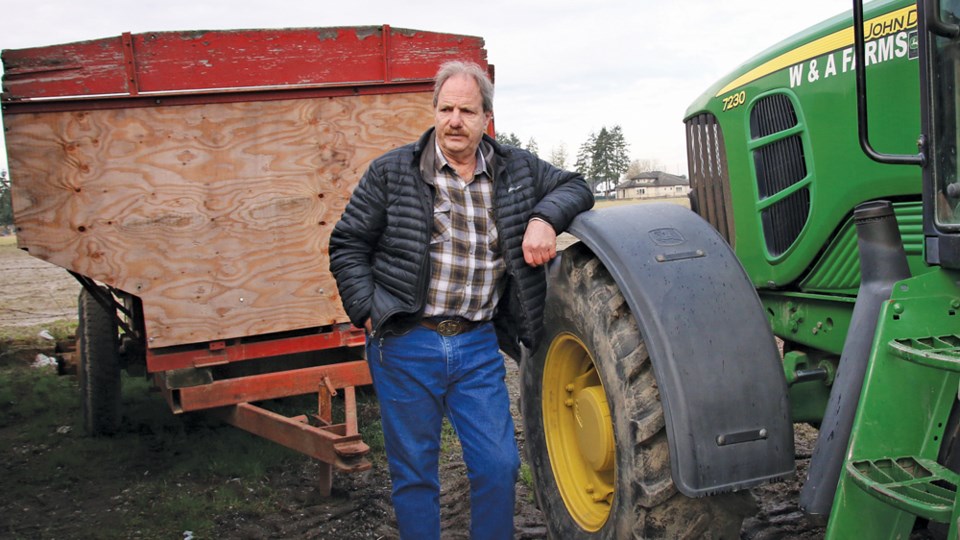W&A Farms owner Bill Zylmans was grappling with soaring fertilizer prices even before Russian President Vladimir Putin decided to invade Ukraine.
Now, he is dealing with high fertilizer prices and high fuel costs.
Russia’s war in Ukraine sparked global condemnation and sanctions that have yet to fully find their way into fertilizer, fuel and food prices.
“There are going to be direct costs that are going to be detrimental to agriculture,” Zylmans told Business in Vancouver. “Fertilizers were up 25% from last year already.”
Russia’s top export to Canada in 2021 was fertilizer, valued at $356.8 million, according to BC Stats.
Sanctions on Russian trade could keep that country’s fertilizer on home soil — a scenario that sent prices soaring for potash, nitrogen and other fertilizer components in the weeks after the Russian invasion. Share prices for producers, such as Nutrien Ltd., Mosaic Co. and CF Industries, jumped in tandem.
Other inflation could come because Canada revoked most-favoured-nation status for Russia and Belarus as trading partners.
That means that those countries’ exports to Canada will be subject to a 35% tariff. The only other country in that trade category is North Korea.
Soaring energy prices are also hitting Zylmans in the pocketbook. He uses gasoline and diesel fuel in farm equipment to plant and harvest crops such as potatoes, cauliflower, carrots, strawberries and pumpkins on 250 acres.
He also delivers some products to wholesalers by truck.
With per-acre input costs easy to calculate and uncertainty reigning on what kind of weather Metro Vancouver will get this summer, farmers may decide to limit risk and plant less, he said.
Zylmans believes many B.C. farmers may decide to forgo planting crops on what they consider “marginal” land or property that has a higher likelihood of flooding or drought.
“Every farmer is going to be a little more careful, and more strategic, on how he plans, and how he operates, and where he’s going to take risks or how he wants to take risks,” Zylmans said.
Less planting would reduce B.C. food production, potentially hiking prices. Zylmans expects farmers will raise prices in what he calls a “trickle approach,” where some immediately charge more for certain items, and that leads to others to do the same. Incremental price hikes then follow.
University of British Columbia faculty of land and food systems professor James Vercammen agreed.
“It doesn’t happen overnight,” he said of food price inflation. “Eventually, it will trickle through.”
Higher gas prices raise costs for truckers transporting produce to B.C. from California, but because trucks can transport so much product, the cost hike per item could be as low as $0.10 on a $3 head of lettuce, Vercammen said.
“A lot of times not even that rate will be passed on right then and there, but in the long term it will be,” he said.
Wheat and corn prices have increased because Ukrainian and Russian farmers grow those crops. Vercammen said Chicago Board of Trade wheat prices were about US$8 per bushel a few months ago. Those prices hit a record US$12.94 on March 7.
While this will help Canadian prairie farmers earn more profit from crops, it is likely to increase prices for items such as bread and animal feed.
“When you get higher feed prices, it becomes less and less profitable to raise cattle,” Vercammen said. “Some farmers could cut back or get out of raising cattle, and then you’d have a shortage of cattle, and prices would go up.”
On the positive side, Oppenheimer Group CEO John Anderson told BIV that farmers in Argentina and Chile export a lot of products to Russia.
If sanctions cancel those shipments, those products — grapes, stone fruit and citrus fruit — would be available on the world market, thereby bringing prices down, he said.
Anderson’s Coquitlam-based company is one of the world’s larger produce wholesalers. It generates more than $1 billion in annual revenue and has 15 offices in North America, three in South America and one in Africa.
Russia does not export large volumes of fruit or vegetables, Anderson said.
“What I think will also happen is we’ll get more disruption to the supply chain, because some of the ships out there are Russian vessels. Those are now being banned from being used, so it will make the supply chain even tighter than it is right now.”
He added that even though only around five per cent of the globe’s freighters are Russian, it will have an effect.
Products could take longer to arrive at destinations and that will lead to short-term outages, yielding increased prices for that diminished supply.
“It’s just more disruption to the already disrupted supply chain, and that will create more costs,” he said.



